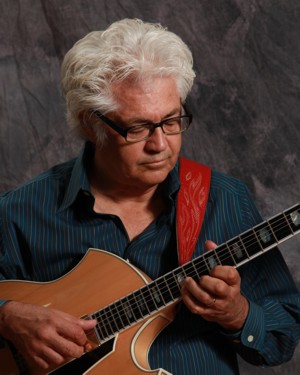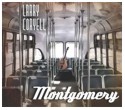
photo - Michael G. Stewart
Larry Coryell
Montgomery

Larry Coryell
Montgomery
info order $12.00
download $9.99
Larry Coryell - guitar
John Colianni - piano
Jim Cammack - bass
Tales of the Montgomery Bus Boycott *
Along Dexter Avenue * Joy at the Jail *
Amazing Grace * L'Homage * Beautiful Love *
What Are You Doing the Rest of Your Life?
"Montgomery" is based on the events in Montgomery, Alabama
that took place in 1955 and 1956 as the social upheaval that resulted
in American integration began to roll its own particular tide toward righting
the tottering ship of race relations in our country.
"Tales of the Montgomery Bus Boycott" starts with a young black,
pregnant teenage girl named Claudette Colvin who, in March of 1955, decided
not to move to the back of the bus. That composition is about her courage.
"Along Dexter Avenue" is about the bombing of Dr. Martin Luther
King's house, which was, I believe, on the same street as the Dexter Avenue
Baptist Church. I recall taking an overseas flight through Atlanta International
Airport a few years ago and they had a display of King memorabilia in
a glass case in the concourse. Inside the case was an inspired letter
written by King to his parishoners. I read that letter and cried. "Along
Dexter Avenue" is not a blues form per se, but it's some kind of
blues. African-Americans were
only trying to establish the decency and dignity that all human beings
deserve, for themselves.
"Joy at the Jail" was composed for what took place in the Mongomery
jail where Dr. King was incarcerated, and he soon got over the shock of
his arrest because his followers surrounded the jail and he ended up having
to go outside to address this huge throng of well-wishers. The piece is
written in the bebop style of mainstream jazz from the fifties. John Colliani,
Jim Cammack and myself experienced our own vicarious joy when we recorded
this tune--especially Cammack's blues/funk phrase played at a rapid, repetitive
pace in his solo.
The nature of Dr. King's task as an innovative leader brought to my mind
the "Amazing Grace" song, so we did our own version. The first
sixteen bars were arranged by the late Teo Macero, Miles Davis' producer
at Columbia records, and I did the rest. I wanted to put that remarkable
feeling of experiencing a spiritual epiphany into a different musical
context, hence the off-the-wall arrangement.
"L'Homage" is simply my bowing down and touching the feet of
the great man, Martin Luther King, Jr. I had seen him speak at the University
of Washington when I was a sophomore there in the early sixties. Even
at my tender age I knew I was in the presence of an extraordinary human
being.
It has been said by my life-teacher, Daisaku Ikeda, that a profound human
revolution in a single individual can change the course of history for
the better. Dr. King was such a person. I want to encourage all of you
who hear this record to spur yourselves to do the same; to do the best
with your life.
We played two standards that I feel supported the transcendant theme that
was the civil rights movement. The message of "Beautiful Love"
speaks for itself. Musically, the composition touches me deeply because
this was one of Joe Pass' favorite tunes.
"What Are You Doing the Rest of Your Life" is, as an instrumental,
a message to make sure that all of us, as we head down the road of existence,
take great care to live our lives with no regret, in spite of whatever
obstacles may come our way. This was one beautiful arrangement by our
brilliant pianist John Colliani, whose technique is surpassed only by
his deep soul. I appreciate, from the bedrock of my existence, John and
James for their incredible efforts to make this project a reality.
In closing I want to say to my stellar musicians/colleagues and to you, our listeners, the only words spoken to me by John Coltrane when I met him: "Thank You!"
Thank you, good people who love music.
Thank you, all those who have helped me create good karma in this lifetime.
Thank you, Tom Mindte, for making this project happen.
Orlando Florida
November 15, 2010
Larry Coryell
LARRY CORYELL is one of the world's acknowledged guitar masters. He has
recorded more than 75 albums over the past 40 years as a bandleader, soloist
and 'featured accompanist'. Hailed by his legion of fans as one of "the
guitar gods" in the late 1970s and as a "truly Renaissance musician
who excels at all styles of playing", he has also been christened
as "a true pioneer of rock-jazz fusion" by the New York Times,
and dubbed "the Godfather of Fusion" by Dan Ouellette of Down
Beat Magazine.
Born in Galveston, Texas, Larry tried his hand at a number of instruments before settling on the guitar. He credits Chet Atkins, Chuck Berry and (later on) Wes Montgomery, as his prime influences. Larry arrived in New York City via Seattle in 1965, and began honing his formidable instrumental skill as the basis for his musical expression. To master every aspect of the guitar, Larry also studied classical guitar with Leonid Bolotine. After developing the first incarnation of his virtuoso technique Larry played his "first big time job" with Killer Joe Piro. National recognition then came during his tenure with the Gary Burton Quartet in 1967.
The late 60s thru early 70s saw Larry as one of the most in-demand guitarists in Rock, Jazz and all musical genres. During that time Larry was part of Rock's experimentation, and toured with Jack Bruce, and was featured in sessions with Jimmy Webb, the 5th Dimension, Charles Mingus, Billy Cobham, Chick Corea and John McLaughlin. Through the albums produced during this period, Larry Coryell emerged as a profound music prophet who merged Rock, Jazz, Eastern modes and scales and free-form improv flashing Classical riffs.
In 1974 Larry formed The 11th House , the most popular and successful Fusion band of its time, which included his friend and colleague Randy Brecker. After The 11th House disbanded, Larry was signed by Clive Davis for Arista Records, where he made a series of solo albums, followed by a direct-to-disc recording with the Brecker Brothers.
Larry Coryell's recordings and live concert performances have run the gamut from clubs large and small, and concert venues large and small from the 1980s thru today. A regular headliner at the Blue Note and Iridium in New York City, Catalina's in L.A., Blues Alley in Washington DC and Ronnie Scott’s in London to Porgie & Bess’ in Vienna. Larry is also no stranger to the huge open-air music festivals in the FarEast, Europe, Brazil, even sell-out appearances at London's Barbican.
In 2007 The Hal Leonard Corporation released Larry’s Autobiography
“Improvising, My Life In Music” and a retrospective print folio
of Larry's own compositions, with works representing the full span of
his 40 years-and-counting as a professional musician, composer and innovator.
Going back to his former alma mater , the University of Washington, Larry
has brought his knowledge and professional technique to top-level music
students in recent years, adding to his stature as "one who can DO,
as well
as teach" already established by his 2 hard-cover books on the subject
published
by Miller- Freeman.